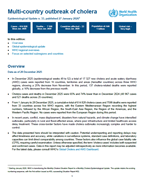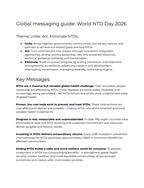Support to regulatory authorities
First, the risk of contamination through blood-borne pathogens like HIV, hepatitis B and hepatitis C which cause life threatening diseases world wide. Second, the difficulties in validating quality assurance systems due to the inherent variability of biological products.
National Regulatory Authorities need to be competent, independent, with strong political backing and have clear authority to develop and enforce appropriate regulations. They also need to interact closely with medical and scientific institutions and civil society organizations representing health care users and professionals in the countries.
Unfortunately, the National Regulatory Authorities in many countries often do not have this type of professional structure. Efforts should therefore be made to strengthen technical capacity and expertise of National Regulatory Authorities worldwide. Technical and regulatory guidance is provided on main topics in this Web Site (see left side). Information is also available in the Recommendations made by the International Conference of Drug Regulatory Authorities (ICDRA) that has served, since 1980, as a global forum to meet and discuss ways of strengthening collaboration.
Focus areas
Meeting reports

Syrian Arab Republic: WHO Health Emergency Appeal 2026
Fourteen years of conflict and underinvestment have left Syria’s health system severely weakened amid economic collapse, displacement and repeated...

occupied Palestinian territory: WHO Health Emergency Appeal 2026
Humanitarian and health conditions in the occupied Palestinian territory have sharply deteriorated since October 2023, following prolonged conflict and...
/health-promotion-(hpr)/more-physical-activity-(run)/11th-sports-dialogue.tmb-144v.jpg?sfvrsn=34da52ee_1)
Eleventh WHO Dialogue with the Sports Industry on the implementation of the Global Action Plan on Physical...
WHO held its eleventh dialogue with representatives of sports-related industries as a virtual meeting on 16 October 2025. Participants exchanged updates...
/health-promotion-(hpr)/less-alcohol-(les)/sri-lanka-country-snapshot.tmb-144v.jpg?sfvrsn=8d111542_1)
Country snapshot on alcohol and health: Sri Lanka
The SAFER country snapshots on alcohol and health provide an overview of national alcohol consumption, its health burden, the current policy response and...

From 1 January to 28 December 2025, a cumulative total of 614 828 cholera cases and 7598 deaths were reported from 33 countries across five WHO regions,...

Global messaging guide: World NTD Day 2026
Theme: Unite. Act. Eliminate NTDs.Unite. Bring together governments, communities, civil society, donors, and partners to achieve our shared goals and end...
WHO publications




